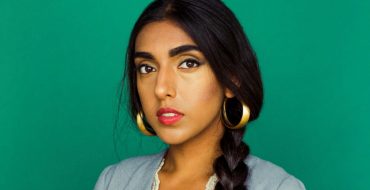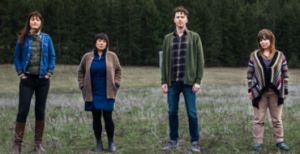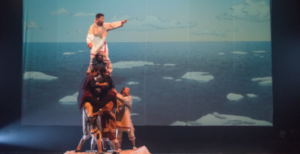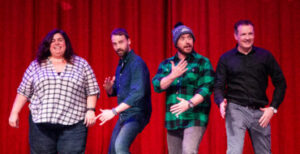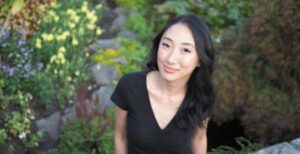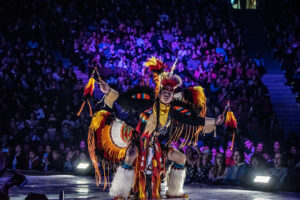In a sparkling olive dress, 26-year-old Hindu-Canadian poet Rupi Kaur rose to the occasion of giving rainy Vancouver’s audience a warm and mellow Wednesday night at the Orpheum Theatre.
The Sun and Her Flowers writer has been the subject of all kinds of judgment since her 2014 ascent to fame with the release of her first book titled Milk and Honey. Earlier this year, the August Poetry Journal PN Review published a critique titled “The Cult of the Noble Amateur” written by Rebecca Watts. In it, Watts defines the cohort of young female poets’ social media success “a denigration of intellectual engagement and rejection of craft.” She classifies Kaur’s work as adhering to clichés, therefore favouring consumer-driven content.
Although it’s true that the crafting legacy of traditional poets is shifting significantly with the praise of short-form prose, what’s overlooked in the commentary is the variety of themes included in Kaur’s work, defying the categorization of ‘cliché.’ Because for anyone who has read her books attentively, a series of oaths to homelands, shout outs to friendships, and expressions of gratitude to families are found amoungst the seemingly vast sea of melodramatic relationship poems.
Consequently, Kaur encourages us to redefine the meaning of love. For a generation raised under the word’s primary embodiment as couples, it’s important to include other mutations of love in the conversation. Within her repertoire, she shared a poem titled “the underrated heartbreak,” which expresses the sorrow caused by a friendship break-up. Before reading it she asked the public why we are used to limiting the structure of a heartbreak, an ache inflicted by different people and for multiple reasons. She half-jokingly, half-seriously complained about its under-representation in the arts.
“Seriously, why don’t they make more movies and songs about it? Like, what are you doing Adele?”
But not everything she mentioned about friendship was nostalgic. Referring to former relationship break-ups, she praised her girlfriends’ ‘text essays’ for getting her out of bed and into the shower. “Thank God for friends with zero shame who tell you the harsh truth out of love.”
She then laughed at her best friends’ refusal to attend her “self-thrown pity parties” and assured us that they were both a shoulder to cry on but also the slap in the face she needed afterwards. These are the best kind of friends, those who “encourage you to look at yourself in the mirror and realize you’re too cute to keep crying over that sucker.” Afterwards, she boarded the topic we can’t keep ourselves from being drawn to: relationships.
Featuring jealousy to the classic overthinking, Kaur delivered an intense interpretation of her piece “Questions” amidst background music that escalated from delicate to flamingly sensual vibrations. This led her to discuss the relationship with our bodies, and how they’re deeply connected to our sense of self-love. Her earlier work highlighted stories of sexual abuse and domestic violence but following it she “tried to balance the collection with stories of pleasure through sexuality.” She celebrated the beginning of rape culture’s downfall, warning us to leave the mindset that thrived for centuries behind.
Additional motifs included the adaptation to puberty, mental health stigma, and inter-familial dynamics. But one she emphasized was the complexity of immigrant life. Joshing about her mom’s passion for the grocery store’s international food isle and how embarrassed she was by it, she took a deeply sentimental turn with her poem “Boat for Alan.” Kaur dedicated it to four-year-old Syrian boy Alan Kurdi’s controversial death, and with it dismissed all allegations of her superficiality as an Instagram poet.
Overall, what Kaur disclosed to be her “second to last show for a long time” ascribed new factions to the face of love, invited an open conversation about the issues we feel connected to, and broke the emotional boundaries we set for ourselves in the fear of becoming vulnerable. Undoubtedly, the writer rejects fixed structures, but perhaps that’s what got her a standing ovation at the end of the show.


